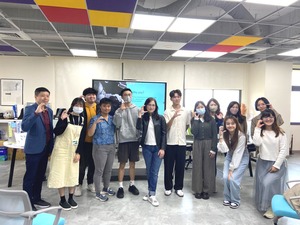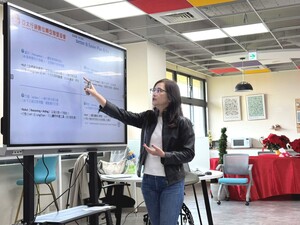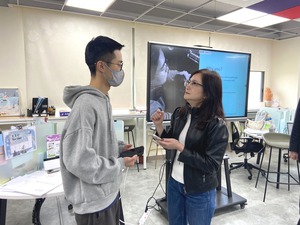





【Article by GCIT】
As digital technologies evolve rapidly, artificial intelligence (AI) is reshaping the marketing ecosystem. On March 24, the Master’s Program in Global Communication and Innovation Technology (GCIT) at National Chengchi University (NCCU) hosted an industry mentor lecture featuring Elle Huang, Chairwoman of the Asia-Pacific MarTech Transformation Alliance Association (AMT). In her talk, Huang offered an in-depth analysis of the revolutionary impact of Generative AI on marketing technology and provided students with expert advice on navigating career development in the AI-driven era.
Elle Huang brings extensive international experience in marketing management. She previously served as CEO of Omnicom Group Taiwan and, in 2017, founded INTELLE Consulting, a firm specializing in digital transformation and marketing strategy. As a pioneering figure in Taiwan’s MarTech sector, she played a central role in developing the country’s first MarTech landscape map and is widely recognized for her deep insights into digital strategy.
During the lecture, Huang outlined the development of marketing technology over time. She explained that before 2013, marketing strategies primarily relied on traditional media and budget allocation. However, in today’s digital age, marketing is no longer just about spending money to gain visibility—it requires complex data analysis to understand consumer behavior and adjust strategies with precision.
Marketing 5.0 Is Here: How AI Is Redefining the MarTech Landscape
Huang used concrete examples to illustrate the disruptive impact of Generative AI on marketing. She cited tools like ChatGPT, MidJourney, and DALL-E to demonstrate how AI can now rapidly produce high-quality copy, images, and multimedia content, helping businesses dramatically shorten their creative production cycles while lowering costs.
“Today, a single marketing professional using AI tools can accomplish what used to require a five-person team,” Huang noted. This transformation, she emphasized, improves efficiency and fundamentally reshapes marketing team structures and role expectations.
Precision Marketing and Personalization: The Competitive Edge of MarTech
Huang further explored the core concept of precision marketing, explaining that modern marketing has shifted from broad exposure to personalized outreach. She stressed the importance of First-Party Data as a key to competitive success. Using Uniqlo and Netflix as examples, she illustrated best practices in data-driven personalization: Uniqlo leverages member purchase data to send personalized promotions, while Netflix’s recommendation algorithm tailors content to user preferences, significantly boosting user engagement.
Looking ahead, Huang painted a clear vision for the future of marketing professionals. In an AI-powered marketing environment, basic marketing knowledge is no longer sufficient. Future marketers must be able to understand how AI tools work, apply strong data analysis skills, think creatively, and adapt quickly to technological change.
She also highlighted how platforms like Meta and Google have already developed advanced algorithms that optimize ad content in real time based on user behavior, resulting in higher conversion rates.
During the Q&A session, students expressed strong interest in the impact of AI on marketing roles. Huang delivered an encouraging message: AI is not here to replace marketers but to unlock unprecedented opportunities for innovation.
“Data-driven thinking and content creativity will be the keys to future marketing success,” she concluded. “The most competitive marketers will be those who can flexibly apply AI tools and extract marketing opportunities through data-driven insights.”
[此中英文稿和圖片以及全球傳播與創新科技碩士學位學程均獲得中華民國文化部的補助。]